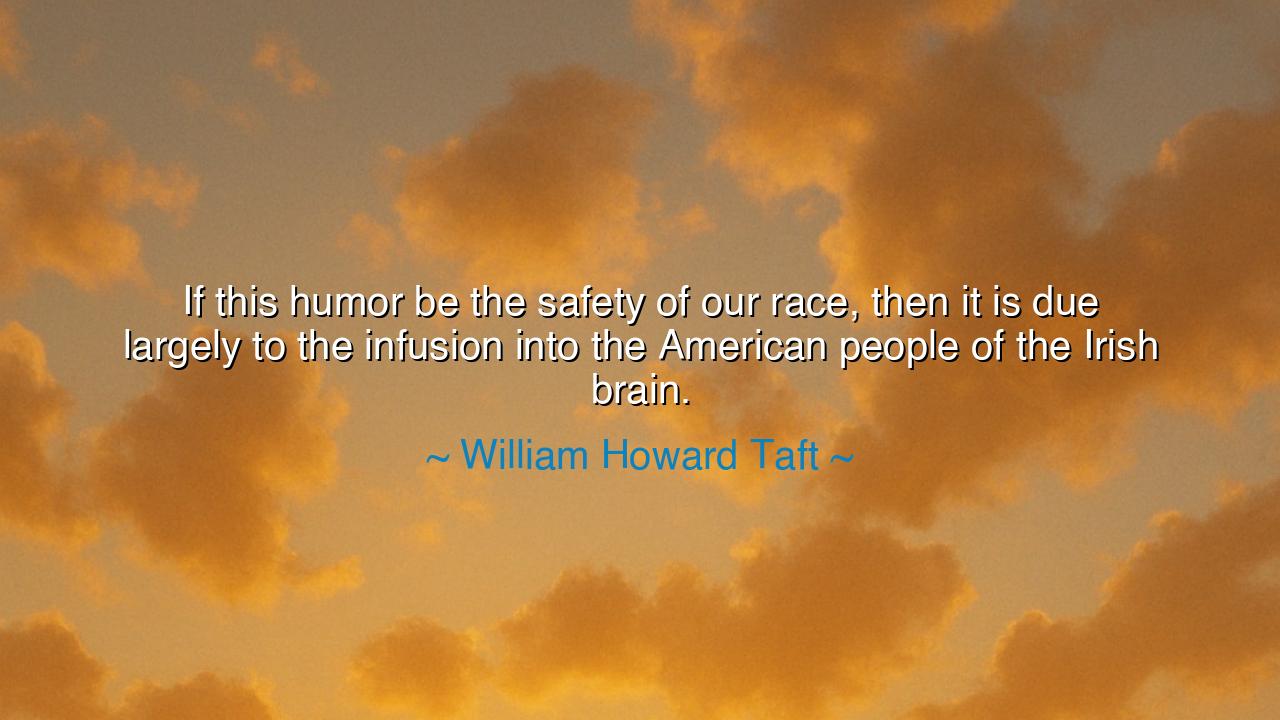
If this humor be the safety of our race, then it is due largely
If this humor be the safety of our race, then it is due largely to the infusion into the American people of the Irish brain.






“If this humor be the safety of our race, then it is due largely to the infusion into the American people of the Irish brain.”
Thus spoke William Howard Taft, a man of reason and reflection, who saw in laughter not a mere pastime, but a power — a safeguard of the human spirit. In his words, he honors the Irish wit, that bright flame which, even in the face of hardship and sorrow, refuses to be extinguished. He reminds us that humor is no small thing: it is the armor of the soul, the bridge between pain and perseverance, the quiet strength that sustains a people through darkness.
To understand his saying, one must remember the Irish people — a nation tempered by struggle, yet never broken by it. Through centuries of invasion, famine, and exile, they bore their suffering not with bitterness, but with humor, that strange and sacred alchemy that turns sorrow into laughter and defeat into resilience. Their jokes were not born from luxury, but from endurance; their laughter, not from forgetfulness, but from wisdom. For those who can laugh at misfortune cannot be conquered by it. And thus, when the sons and daughters of Ireland came to America, they carried with them more than hands to work — they carried the spirit to endure.
Taft, in speaking of “the safety of our race,” recognized that nations survive not by wealth or armies alone, but by the temperament of their people. A people who cannot laugh are brittle; they shatter under strain. But those who find mirth in misery, who can look upon adversity and still smile, possess an unbreakable strength. He believed that this Irish humor, infused into the American spirit, gave it flexibility — the ability to bend without breaking, to confront the harshness of life with cheer rather than despair. Thus, humor became not mere amusement, but a national safeguard, a quiet guardian of sanity and hope.
Consider the tale of Abraham Lincoln, who, like the Irish he admired, wielded humor as both shield and sword. During the darkest days of the Civil War, when the nation was torn by grief, Lincoln often disarmed sorrow with wit. Once, when criticized for laughing during wartime, he replied, “If I did not laugh, I should die.” His laughter was not callousness, but courage — the same courage Taft saw reflected in the Irish mind, that could see the absurdity in tragedy and yet continue forward. Humor, in such souls, becomes not denial but defiance — the refusal to surrender one’s joy to the cruelty of fate.
The Irish brain, as Taft calls it, is not merely clever; it is profoundly human. Its humor cuts with irony, dances with wordplay, and yet always carries warmth. It finds light in contradiction and hope in irony. It teaches the wisdom that life, though fierce, is not without jest — that even pain may be laughed at, not to diminish it, but to claim mastery over it. This is the humor that shaped poets like W.B. Yeats and storytellers like James Joyce, who turned the tragedies of their people into songs and stories that stirred the world. It is a humor that elevates, not mocks — that saves, not wounds.
William Howard Taft, though an American president, spoke not as a politician but as a philosopher when he uttered these words. He saw that the Irish influence in America was more than cultural color — it was a moral inheritance. Through their laughter, Americans learned not to take themselves too seriously, to meet adversity with irony rather than outrage, to face failure with wit instead of despair. For humor, rightly used, is wisdom in disguise. It teaches humility, softens conflict, and binds hearts together in shared amusement. In it lies the secret of endurance, the very safety of the race.
And so, let this teaching be carried forward:
-
Cherish humor, for it is the soul’s shield against despair.
-
Laugh at hardship, not to ignore it, but to rob it of its power.
-
Learn from the Irish spirit, which finds light even in exile, song even in sorrow.
-
Use wit kindly, for true humor uplifts, never wounds.
Thus spoke Taft, and through him echoes a timeless truth — that humor is not folly, but fortitude. It is the laughter that rings out from the battlefield, the jest that comforts the weary, the story that survives when all else has fallen silent. The Irish brain, infused into the heart of a nation, gave America not only charm but courage — a reminder that the soul’s safety lies not in solemnity, but in joy. For the one who can laugh, even in tears, is never truly defeated — and that, above all, is the mark of a free and enduring people.






AAdministratorAdministrator
Welcome, honored guests. Please leave a comment, we will respond soon